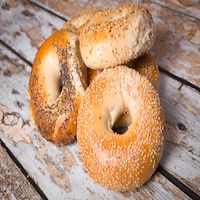Starchy Foods Can Increase Risk of Lung Cancer
People who eat sugary, starchy foods potentially are at higher risk for lung cancer, even if they don’t smoke.

People who eat sugary, starchy foods potentially are at higher risk for lung cancer, even if they don’t smoke.
Researchers noted that foods with a high glycemic index — like bagels, white rice, melons, and pineapples – raise blood sugar levels and stimulate the production of insulin.
A team of researchers at MD Anderson Cancer Center, Houston, TX, assessed 1,905 patients who had recently been diagnosed with lung cancer and compared them to 2,415 people without cancer. The study patients were required to answer detailed questions about their eating habits, smoking, income, etc.
Findings published in the journal Cancer Epidemiology and Biomarkers showed that people who ate foods with a high glycemic index were approximately 50% more likely to be diagnosed with lung cancer than those who consumed the fewest high-glycemic foods.
The American Diabetes Association highlighted varied levels of low-glycemic foods:
Low glycemic (55 or less)
· 100% stone-ground whole wheat or pumpernickel bread
· Oatmeal (rolled or steel-cut), oat bran, muesli
· Pasta, converted rice, barley, bulgar
· Sweet potato, corn, yam, lima/butter beans, peas, legumes, and lentils
· Most fruits, non-starchy vegetables, and carrots
Medium glycemic (56-69)
· Whole wheat, rye, and pita bread
· Quick oats
· Brown, wild, or basmati rice, couscous
High glycemic (70 or more)
· White bread including bagels
· Corn flakes, puffed rice, bran flakes, instant oatmeal
· Short grain white rice, rice pasta, macaroni and cheese from mix
· Pretzels, rice cakes, popcorn, saltine crackers
· Melons, pineapple
According to the study, “non-smokers were more than twice as likely to have lung cancer if they reported eating a high-glycemic diet”.
Xifeng Wu, MD, study leader, said, “The results from this study suggest that, besides maintaining healthy lifestyles, reducing the consumption of foods and beverages with high glycemic index may serve as a means to lower the risk of lung cancer.”
Although experts haven’t found definitive answers, high-glycemic foods are believed to stimulate the body to make insulin that impacts the growth of cells through compounds called insulin-like growth factors (IGF) — inadvertently triggering the growth of small tumors.
“Previous studies have investigated the association between glycemic index, and the related measure glycemic load, and a variety of cancers including colorectal, stomach, pancreas, endometrial, ovarian, prostate, and thyroid, but these studies are limited and results have been largely inconclusive,” said the researchers.
Experts acknowledged further research is important to understand how diet and lifestyle can affect cancer.